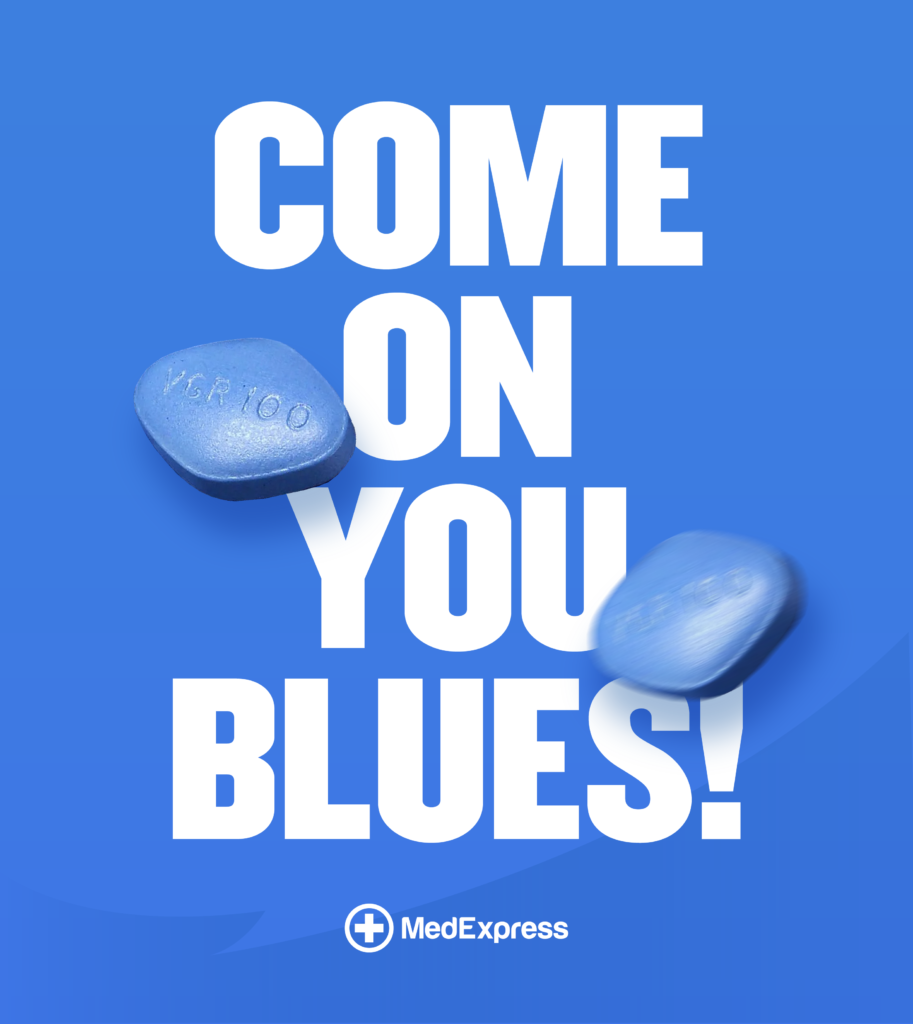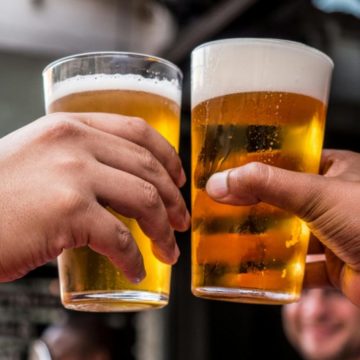2024 has been a monumental year for football, with Euro fever gripping the nation, the excitement of Copa América, and the anticipation of the start of a new season. Yet among the various tournaments, one thing remains prevalent among football fans: alcohol… and lots of it.
The drinking culture associated with being a football fan has long been woven into the sport’s fabric. While celebrating or commiserating with a pint or two is all part of this sporting tradition, it also brings health implications that often go unaddressed.
A report by TakePayments found that Brits drank an estimated 604 million pints during the campaign season – nearly double that of the 2020 Euros[1]. However, what’s most notable is that during the same period, searches for ‘Erectile Dysfunction Treatment’ spiked by 15%[2].
Looking towards the new Premier League season, we at MedExpress are committed to raising awareness about the wider health impacts of alcohol consumption whilst also tackling the stigma surrounding erectile dysfunction.
By surveying football’s most avid fans to uncover the truth behind the drinking culture at Premier League teams, we aim to raise awareness of alcohol’s impact on your health, specifically sexual performance, to normalise and encourage more open conversations around sexual performance.
45% of football fans believe football drinking culture directly impacts their sexual performance
Erectile dysfunction is a complex condition affecting millions of men worldwide and is often exacerbated by alcohol consumption. Our study found that nearly half of all football fans (45%)* believe that the football’s drinking culture is negatively impacting their sexual performance. This sentiment is particularly strong among 25-35-year-olds, with 63% of the age group acknowledging the connection. But why is this, and how many pints do fans really drink?
How much do football fans drink?
On average, the drink consumption between winning and losing scenarios appears to be quite similar, with individuals consuming an average of 3.7 pints when winning compared to 3.6 pints when losing.
However, when delving further into the data to reveal which teams had the most extreme drinking cultures, there were some teams which stood out. Upon further analysis, individuals who reported consuming over 11 pints during a match were most notably Celtic fans (10%), Tottenham Hotspurs fans (6%) and West Ham fans (5%).
This suggests a team’s poor performance is linked with higher consumption of alcohol, possibly caused by the emotional response from fans. For instance, when comparing results with last season’s higher performing teams like Arsenal, their fans exhibited a significantly lower rate of high consumption at 0.9%, while Manchester City fans showed a similar tendency at 1.2%. This suggests that teams with better performances may drive lower alcohol consumption among their supporters, while those lower down the table are commiserating their losses.
Interestingly, our survey also found that while regular drinking does not discriminate against any age group, 12% of those aged 18-24 years old reported they never drink during a game – more than any other age demographic. This trend suggests a shift in attitudes towards alcohol consumption among Gen-Z, who according to our survey were found to be the least likely age group to struggle with erectile dysfunction. However, while their lower alcohol consumption may benefit them in the future, it is more likely that their youth and lower susceptibility to medical conditions are the primary reasons as to why they experience fewer issues with ED.
Is alcohol causing an increase in ED among football fans?
Is Stella Artois causing erectile dysfunction? There is no medical evidence to say that Stella Artois specifically causes erectile dysfunction. However, Stella Artois is the most popular pint among football fans and as we know alcohol impacts sexual performance, it’s popularity and predicted high consumption during matches will likely be playing a role.
The study revealed that Stella Artois is officially the most favoured pint, with 70% of football fans choosing it as their match tipple. This is followed by Guinness (20%) then Heineken and Carling, accounting for a remaining 10%.
The study surveyed each fan on how long they believed they could last during sex both with and without alcohol. This allowed us to calculate an overall average time and assess alcohol’s effect on their sexual performance.
When questioned about how often football fans last in bed without drinking alcohol, fans said they can ‘keepy-uppy’ longer – with the study revealing the average sex time of a football fan is 14 minutes 46 seconds. Upon consumption of alcohol, this result decreased by 8%, seeing the average time men typically last decreasing to 13 minutes 43 seconds.
Interestingly, the study also revealed that the teams which are keen Stella drinkers averaged a lower “keep-uppy” time in bed. Meanwhile, the fans naming their popular tipple as Heineken (Rangers) or Guinness (Chelsea), averaged a higher “keepy-uppy” time.
While this correlation cannot be specifically attributed to anything scientific regarding the choice of pints, it does highlight the need to recognise that while some people may see erectile dysfunction as a symptom of alcohol consumption, others have also reported longer sex duration than average which can be potentially linked to delayed ejaculation.
Doctor Ashwin Sharma (he/him) explains the role alcohol can play in impacting sexual performance:
“Excess alcohol consumption can impact male sexual function in several ways. Firstly, alcohol impairs our central nervous system, which can delay signals between the brain and penis, causing erectile dysfunction. Additionally, alcohol’s diuretic effect causes increased urination, resulting in dehydration and reduced blood flow, including to the penis. This dehydration can also elevate your levels of angiotensin, a hormone associated with ED.”
“Alcohol consumption can also impair sexual function, leading to delayed ejaculation. This is due to alcohol’s depressant effects on the central nervous system, which can slow the brain’s ability to send signals that are necessary for ejaculation. Several studies have documented this effect, including research published in the Journal of Sexual Medicine, which highlights how chronic and acute alcohol use can adversely affect sexual performance and orgasmic function.”
How does performance in the bedroom fair in teams with a bigger drinking culture?
The findings indicate a strong correlation between regular consumption of alcohol and the prevalence of ED. For example, fans of Rangers report the highest incidence of ED at 38% and also have the highest rate of regular drinking at 69%.
On the other end of the scale, Manchester City fans have the lowest incidence of ED among the top ten clubs at 17%, and they are the least likely to be regular drinkers at 44%.
These statistics highlight the importance of understanding the impact of lifestyle choices on sexual health and the need to foster open conversations about ED without stigma.
Friendly Competition: The Keepy Uppy Leaderboard
In the spirit of friendly competition and to emphasise the role alcohol plays in impacting sexual performance across multiple fans, we have visualised the data set as a Premier League table.
As previously stated, both the Rangers and Chelsea fans saw an average increase in performance time after consuming alcohol – helping put the Rangers at top of the keepy-uppy league. However, this can be a sign of alcohol-induced delayed ejaculation. Rangers fans average 19 minutes 13 seconds with alcohol, however this then reduces to 14 minutes 01 seconds without alcohol.
The study also found that West Ham fans felt they had the most stamina in the bedroom before alcohol, clocking in an average of 18 minutes 49 seconds in the bedroom. However, after alcohol this figure dropped by 16%, ranking them second among football fans at 15 minutes 53 seconds.
Meanwhile, fans of Manchester United and Tottenham Hotspurs have been found to be most impacted by alcohol’s impact on sexual performance, with an average performance duration of 12 minutes 13 seconds after alcohol. This is an average decline of 31%.
84% of football fans believe there is still a stigma around discussing erectile dysfunction
Despite the data emphasising how ED affects the majority of football fans, 84% of men still believe there is a stigma around discussing erectile dysfunction. We want to encourage this stigma to be dismantled, especially considering that 56% of football fans report experiencing ED. This means that when you’re watching a match, at least one in every two people around you has also experienced ED and we want to encourage people to be more open to those who can show support or share in similar experiences.
Football fans would prefer to remain silent than discuss ED with their family or friends
Overall, the study found that football fans would most likely open up to their doctor (54%) than their partner (45%) when experiencing erectile dysfunction.
They also expressed a preference for avoiding the topic of ED altogether rather than discussing it with family or friends.
45-54-year-olds appeared the most closed off to opening up, noting that most commonly they would prefer not to open up. In contrast, 25-34-year-olds are 310% more likely to open up to their friends about erectile dysfunction, this is likely attributed to a change in generational attitudes.
So, with many treatment options readily available to help tackle this issue, and with the data highlighting just how common it is, we believe it is time to give the taboos around discussing erectile dysfunction the red card.
Moving forward, let’s encourage everyone, regardless of what team you support, to have a more open-minded approach when discussing sexual well-being, as it’s more than likely they’ve already experienced themselves.
Methodology
1- 604.5 million pints being drunk during Euros 2024 statistic – sourced from TakePayments report here.
2- Google Searches for ‘Erectile Dysfunction Treatment’ rose 15% in the past month, correct as of 17.07.2024 (data sourced using Glimpse tool to analyse)
* Attest survey platform was used to conduct research from across the UK to make it a nationally representative survey on football culture, alcohol behaviour and the impact on sexual performance.



